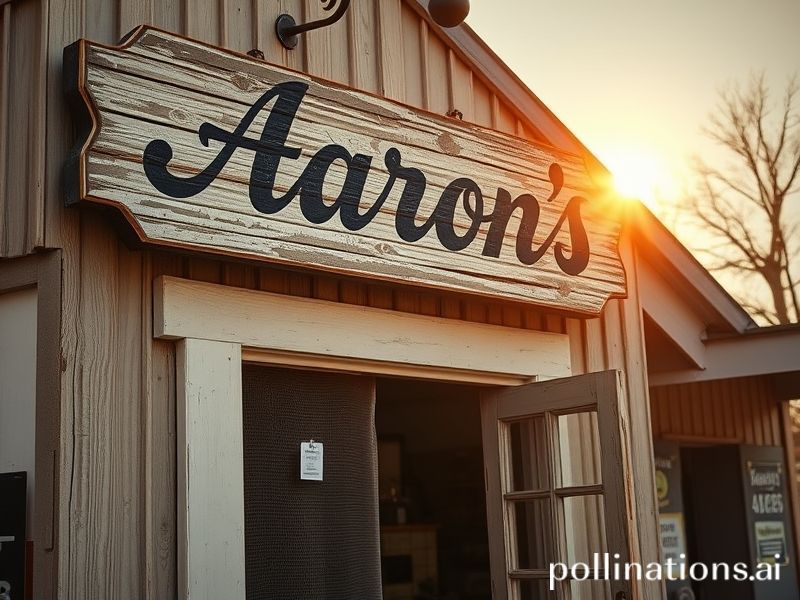From Georgia to the Globe: How Aaron’s Became the Multinational Ministry of Deferred Dreams
Aaron’s, the rent-to-own furniture empire that began in 1955 Georgia, now spans three continents and 1,300 stores. From the outside it looks like a cheerful beige box peddling sectional sofas to people whose credit scores have been mugged by life. Step inside, however, and you’re touring a museum of planetary precarity: beds still warm from the last eviction, televisions that have binge-watched their owners’ marriages implode, refrigerators humming lullabies to the gig-economy night shift.
The international footprint is instructive. Aaron’s corporate cousins—Home Choice in South Africa, Progressive Leasing in Australia—translate the same business model into local dialects of desperation. In São Paulo, it’s “móveis sem entrada”; in Manila, “rent-sangla.” Each phrase means: you can take home today what you’ll still be paying for when the sea finally reclaims your coastal barangay. The carbon footprint of a single Aaron’s loveseat is now measured in both kilograms of CO₂ and the number of passports stamped by repo men chasing it across borders.
Global economists, ever the romantics, classify this as “democratized asset access.” Translation: if the world economy is a casino, Aaron’s is the pawnbroker standing just outside, buying your watch so you can run back in and double down on red. In South Korea, similar schemes are called “my-money-next-week” plans; in Sweden, they’re wrapped in minimalist UX and called “circular living.” Same sofa, different illusion of dignity.
Of course, nothing says late-stage capitalism like paying $2,199 for a $699 coffee table because you needed it before the next algorithm decided your job was redundant. Aaron’s kindly reframes this as “flexible ownership,” a phrase linguists rank somewhere between “military intelligence” and “airplane food” on the oxymeter. Meanwhile, the World Bank cites rent-to-own as a growth driver in emerging markets, which is a bit like praising the efficiency of the plague for freeing up urban housing stock.
Culturally, the brand has become a global shorthand for hovering just above ruin. In Nairobi stand-up clubs, a joke about your girlfriend “having more installments than an Aaron’s stereo” reliably kills. In Warsaw, the phrase “na Aaronsa” has entered the vernacular for any commitment you’ll regret by Christmas. The company’s jingle—now translated into nine languages—has the uncanny ability to make children cry in airports when they realize the Xbox in their carry-on might not clear customs because the final payment bounced.
The geopolitical angle is equally rich. When the U.S. Federal Reserve tweaks interest rates, Aaron’s stock in Johannesburg hiccups within minutes; call it the butterfly defect. Trade-war tariffs on Malaysian rubberwood bump the price of bedroom sets in Guadalajara, reminding us that your peaceful night’s sleep is hostage to a quarrel you didn’t start and can’t pronounce. Meanwhile, Chinese container ships full of pre-rented futons circle the Pacific like ghost taxis, waiting for ports that may or may not accept another crate of deferred dreams.
And yet, Aaron’s persists—because human optimism is the one commodity still not subject to supply-chain disruption. Every new customer signs a pact that says, in the fine print of universal hope, maybe this time the paycheck lasts longer than the billing cycle. The company’s 2023 annual report calls this “customer-centric resilience.” The rest of us call it the human condition with a delivery fee.
So, as COP delegates argue over carbon credits in air-conditioned tents, and crypto evangelists promise decentralized utopia in Discord channels, Aaron’s quietly continues its multinational ministry: turning tomorrow’s uncertainty into today’s living-room set, one bi-weekly payment at a time. It is, in its own beige, inimitable way, the most honest multinational still standing—an empire built not on what we own, but on how expertly we’ve learned to rent our own collapse.







